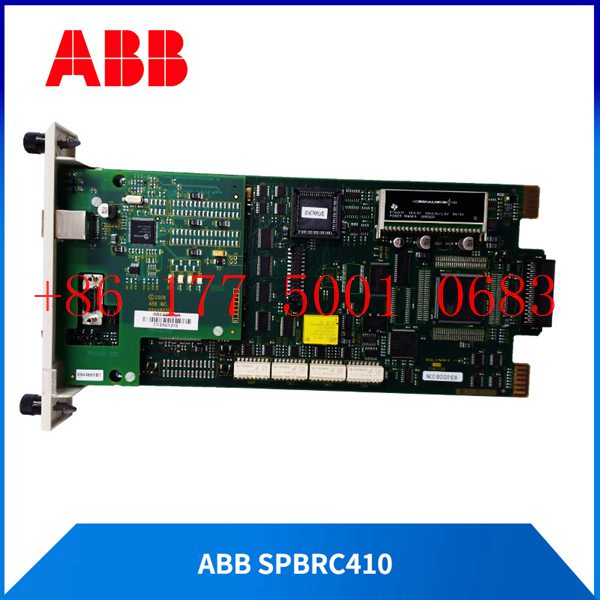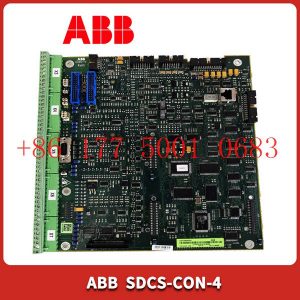Description
hardware flow control. It is an ideal choice in the field of industrial automation.
Practical application of ABB industrial information control system 800xA in main shaft hoist control
introduction
The mine hoist is an important transportation equipment for mining enterprises. Its main function is to transport the ore,
personnel or equipment that need to be transported to the destination by the lifting container. Therefore, it plays a very
important role in the mining production process. Usually the mine hoist control system consists of a driving part and a
control part. The working mechanism
of the driving part is: the motor unit drives the mechanical hoisting device, and the frequency converter or other types
of hoisting control systems drive the motor unit: the working mechanism of the control part is: Each component of the
hoist is coordinated and controlled by the
Distributed Control System (DCS). In addition to completing basic process control, it can also integrate intelligent instruments,
intelligent transmission and motor control, and even production management and safety systems into one operation and engineering environment
middle. Therefore, the mine hoist requires a control system with high performance, high reliability, and high integration.
1ABB800xA system and AC800M controller introduction
1.1ABB800xA system introduction
The 800xA system is an industrial information control system launched by ABB. The core of its architecture is
object-oriented (ObjectOriented) technology. Due to the adoption of ABB”s unique Aspect0object concept,
enterprise-level information access, object navigation and access can become standardized and simple.
In order to provide a unified information platform for enterprise managers and technical personnel, the 800xA system
provides a base platform (BasePlatform), which relatively separates the process control part and production control
management and organically combines them together. As shown in Figure 1, the middle part is the basic platform, the upper part is the production control
management part, and the lower part is the process control part. The basic platform provides standard interfaces for
these two parts for data exchange.
1.2 Introduction to ABBAC800M controller and its programming configuration tools
AC800M controller is ABB”s latest controller series, which includes a series of processors from PM851 to PM865.
The AC800M controller itself has a pair of redundant TCP/IP interfaces. It can use the MMs protocol to communicate
with other control devices and 800xA operator stations through Ethernet. It can also use the Modbus protocol and
Point-Point protocol through 2 serial ports. communication. The programming and configuration tool of AC800M is
ControlBuilderM,
referred to as CBM. It supports standard ladder diagram, function block language, text description
language and assembly language to write control logic.
2. Improve the design and implementation of control system functions
2.1 Implementation of elevator operating speed curve
One of the main tasks of the lifting control system is to control the lifting motor to operate according to the speed-position
curve given by the design, so that the lifting container passes through the acceleration section, the uniform speed
section and the deceleration section successively, and stops accurately after completing the specified lifting distance
. somewhere in the wellbore. In order to realize the function of precise position calculation, the designed
elevator control system must be able to perform high-precision position calculation based on the photoelectric encoder
connected to the main shaft of the elevator drum. The
calculation formula is as follows:
In the formula, s is the actual position value of the elevator: sp is the distance corresponding to two consecutive encoder
pulses: AN is the difference between the encoder count value at the reference position and the current position (signed variable):
s0 is the reference position value.
The encoder counts are distributed according to the circumference of the drum. After the number of pulses Np generated
by the encoder rotation is known, the diameter of the circumference of the centerline of the wire rope wrapped around the
drum must be accurately known, so that it can be calculated according to formula (2) The distance sp corresponding to the two encoder pulses:
In the formula, D is the circumferential diameter of the centerline of the wire rope: Np is the number of pulses for one revolution of the known encoder.
But in formula (2), there is a value D that keeps getting smaller as the system runs. This is because the wire rope
used in the elevator is wrapped around the drum, and there is a lining between the wire rope and the drum that increases
friction. This liner will become thinner and thinner as the system continues to wear and tear, causing the diameter of the
circle formed by the center line of
the steel wire rope to gradually become smaller. When the pad wears to a certain extent, it will cause a large position
calculation error. In order to solve the above problems, the two parking position switches in the shaft are used to correct the drum diameter, because the
distance between the two parking positions can be obtained through actual measurement with high accuracy. During the
actual operation, record the encoder count values at the two parking positions respectively. According to formula (3),
the actual correction value of sp can be calculated:
In the formula, sd is the distance between two parking positions: Abs is the absolute value operation: N is the
encoder count value when there are two parking positions.
In this way, the initial sp value is first set according to the given design parameter value, and then the value is
corrected according to the actual operating conditions, which can effectively ensure the accuracy of position
calculation. At the same time, sp” can also be substituted into formula (2), and the D value can be obtained in turn,
which can be used as a basis for judging whether the liner is seriously worn.
After obtaining the elevator position value, the speed control curve can be calculated according to formula (4):
Excitation system ABB module NTAI06
Excitation system ABB module NTAI05
Excitation system ABB module NTAI05
Excitation system ABB module NTAI05
Excitation system ABB module NTAI04
Excitation system ABB module NTAI03
Excitation system ABB module NTAI02
Excitation system ABB module NTAI02
Excitation system ABB module NTAI01
Excitation system ABB module NTAC-02
Excitation system ABB module NTAC-02
Excitation system ABB module NTAC-02
Excitation system ABB module NSTM01
Excitation system ABB module NSSM01
Excitation system ABB module NSSM01
Excitation system ABB module NSPS02
Excitation system ABB module NSPS01
Excitation system ABB module NSPM01
Excitation system ABB module NSIM01
Excitation system ABB module NSBM01
Excitation system ABB module NRIO02
Excitation system ABB module NRDO02
Excitation system ABB module NRDI01
Excitation system ABB module NRAO01
Excitation system ABB module NRAI01
Excitation system ABB module NRAI01
Excitation system ABB module NQRS02
Excitation system ABB module NQRC01
Excitation system ABB module NPTM01
Excitation system ABB module NPSM04
Excitation system ABB module NPSM02
Excitation system ABB module NPSM01
Excitation system ABB module NPSI04
Excitation system ABB module NPSI03
Excitation system ABB module NPSI02
Excitation system ABB module NPOW-42C
Excitation system ABB module NPIM01
Excitation system ABB module NPEP04
Excitation system ABB module NPEP03
Excitation system ABB module NPEP02
Excitation system ABB module NPEP01
Excitation system ABB module NPCT-01C
Excitation system ABB module NPBS01
Excitation system ABB module NPBA-12
Excitation system ABB module NMTU-21C
Excitation system ABB module NMRT01
Excitation system ABB module NMPP02
Excitation system ABB module NMPC01
Excitation system ABB module NMFP03
Excitation system ABB module NMFP01
Excitation system ABB module NMFC05
Excitation system ABB module NMFC04
Excitation system ABB module NMFC03
Excitation system ABB module NMFC02
Excitation system ABB module NMFC01
Excitation system ABB module NLSM02
Excitation system ABB module NLSM01
Excitation system ABB module NLMM02
Excitation system ABB module NLMM01
Excitation system ABB module NLIS01
Excitation system ABB module NLIM02
Excitation system ABB module NKTU11-8
Excitation system ABB module NKTU11-24
Excitation system ABB module NKTU11-20
Excitation system ABB module NKTU11-17
Excitation system ABB module NKTU11-16
Excitation system ABB module NKTU11-15
Excitation system ABB module NKTU11-13
Excitation system ABB module NKTU11-12
Excitation system ABB module NKTU11-11
Excitation system ABB module NKTU11-10
Excitation system ABB module NKTU11-09
Excitation system ABB module NKTU02-9







Reviews
There are no reviews yet.